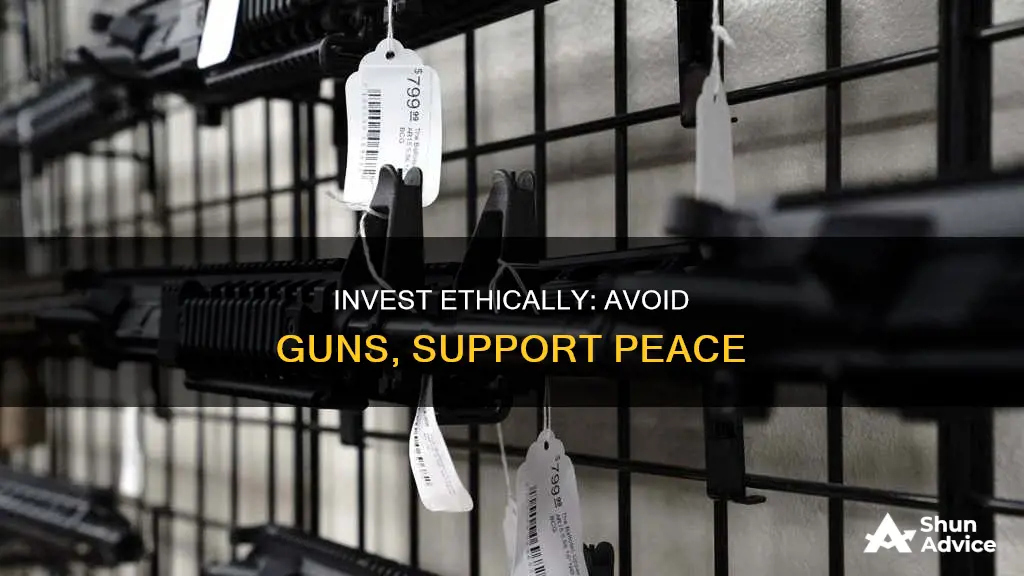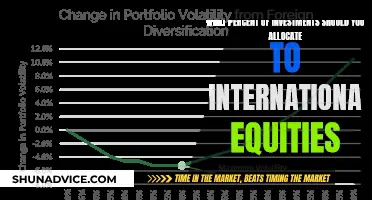
With gun violence in the headlines almost daily, investors are increasingly examining their portfolios to ensure they are not inadvertently supporting gun manufacturers and retailers. Many people are unknowingly investing in guns through their retirement accounts, such as 401(k)s, IRAs, or pensions, or by owning shares of mutual funds, index funds, or ETFs. To avoid supporting the gun industry, investors can screen their portfolios for companies that contribute to the gun trade and shift their money to gun-free funds or socially responsible investment (SRI) options. They can also encourage their employers to offer gun-free investment options and contact fund managers to advocate for more transparent proxy voting decisions that align with their values. It is important for investors to be aware of where their money is going and to ensure their investments align with their ethical standards.
| Characteristics | Values |
|---|---|
| Evaluate your retirement options | 401(k) plans, Exchange Trade Funds (ETFs), IRAs, solo 401(k) plans, or other personal portfolios |
| Know how weapons manifest in your investments | Civilian gun manufacturers, civilian gun retailers, companies involved with military arms contracts |
| Screen your funds | Gun-free funds, ESG funds (environmental, social, and governance standards), mutual funds, index funds |
| Reach out to your employer | Ask to expand your options, contact a company "corporate responsibility team", enlist the help of other employees |
What You'll Learn

Check your mutual funds for investments in gun companies
If you want to ensure your mutual funds aren't supporting gun companies, there are several steps you can take.
Firstly, you can evaluate your retirement options. Most investment options offered by employers are 401(k) plans built out of mutual funds. Alternatively, you might invest through an Exchange Trade Fund (ETF) or an individual savings plan like a Roth IRA or solo 401(k) plan. In any of these forms, your investments may be supporting the arms industry, either directly or indirectly.
You can then screen your investment portfolio for companies that contribute to the gun industry. Look for firearm manufacturers under the industrials section of your portfolio. The two public companies in the US that manufacture guns are Sturm Ruger (RGR) and Smith & Wesson Brands (SWBI). Vista Outdoor (VSTO) manufactures ammunition. If you have any small-cap stock index funds, they will likely include RGR and SWBI.
You can also use online tools like Gun Free Funds or Weapons Free Funds to identify funds that have exposure to guns or other types of weapons and find alternative, more sustainable options. These tools are managed by As You Sow, a non-profit organisation that encourages shareholder activism.
If you discover that your mutual funds are invested in gun companies, you can take steps to change this. If you are using an individually managed, personal portfolio, you will have more control over your fund options. Look for explicitly gun-free funds or socially responsible investing (SRI) options that include gun-free screens, such as ESG funds, which focus on investing in companies that commit to certain environmental, social, and governance standards.
If you are locked into keeping your investments in a company retirement plan like a 401(k), you can still request that your employer adds gun-free options. You can also reach out to your fund manager, a company representative, or an external investment advisor for guidance on shifting your investments to more sustainable options.
Reliance India: A Comprehensive Guide to Investing
You may want to see also

Evaluate your retirement options
Evaluating your retirement options is an important step in ensuring your investments are aligned with your values and goals. Here are some key considerations to keep in mind:
- Understand your investment options: Most employer-offered retirement plans, such as 401(k)s, provide a range of investment choices, including mutual funds, exchange-traded funds (ETFs), and individual stocks and bonds. Each of these options has different risk and return profiles, so it's important to understand the specifics of each before making a decision.
- Evaluate fees and performance: Look for funds with low fees, as high fees can eat into your investment returns over time. Additionally, consider the past performance of the fund, keeping in mind that short-term performance may not be indicative of long-term results.
- Consider your risk tolerance: Different funds have different levels of risk and potential reward. Assess your own risk tolerance and choose funds that align with your comfort level. For example, you may prefer low-risk, low-return funds over high-risk, high-return alternatives.
- Diversify your portfolio: Diversification is a key strategy to reduce risk and maximise returns. Spread your investments across different asset classes, industries, company sizes, styles, and geographies to minimise the impact of any single investment on your overall portfolio.
- Utilise online tools and resources: Take advantage of online tools and resources, such as Morningstar's star ratings, to research and compare different investment options. Additionally, seek out tools specifically designed to help identify gun-free funds, such as As You Sow's Invest Your Values tool and Gun Free Funds database.
- Seek professional advice: Consider consulting a financial advisor or retirement plan manager to help you navigate the complex world of retirement investing. They can provide personalised advice based on your circumstances, goals, and risk tolerance.
Strategizing Dividend Investment: Balancing Your Portfolio
You may want to see also

Know how weapons manifest in your investments
When you choose to invest in funds built from dozens (possibly hundreds or thousands) of company holdings, you could be contributing to the arms industry in a multitude of ways. This includes various sectors of the industry:
- Civilian gun manufacturers
- Civilian gun retailers
- Companies involved with military arms contracts
A typical, diverse portfolio probably has holdings in many of these areas. Larger plans, like S&P 500 funds, might not have direct holdings in gun-related companies, but many still have ties to weapons stocks.
Investing "layers" and the convoluted hierarchy of retirement fund managers within an investor's company can leave many confused about what their money is supporting. Fund managers might explain the presence of gun stock holdings as a good return on your investments, but they aren't guaranteed financial performers. Forbes reported in March 2021 that while gun sales had increased, gun stocks themselves hadn't seen any growth.
Regardless of financial gains, investors have the right to know what industries their money is invested in. It's about transparency and knowing what you own.
Gun manufacturers and retailers that you may be investing in include:
- Smith & Wesson Brands
- Sturm, Ruger & Co.
- American Outdoor Brands
- Vista Outdoor
- Olin Corporation
Retailers that sell guns include:
- Walmart
- Dick's Sporting Goods
Exploring Private Savings and Investment Spending Dynamics
You may want to see also

Screen your funds
Now is the time to take a close look at your investment account. Your investments are likely connected to fund families—a collection of funds (like mutual funds, ETFs, etc.) all managed by one investment company. Your employer will typically offer you a choice of funds within a family like Fidelity, Vanguard, or American Shares.
You can use online tools to screen your funds and divest from companies contributing to the arms industry. As You Sow, a non-profit watchdog and investor advocacy group, publishes data on fund families across more than 100 managers, including Vanguard, Fidelity, and Blackrock, providing information on total investments and stock holdings in both gun manufacturers and gun retailers.
For example, As You Sow found that across 99 Vanguard funds, more than $18 billion is invested in gun manufacturers and retail. While many individual mutual funds on Vanguard's list have zero stock holdings in gun manufacturers, receiving "A" ratings from the nonprofit, other funds are tied up in gun investments.
You can also search through As You Sow's general gun-free funds list, which includes mutual funds and ETFs, to find your investment's rating or look for the top gun-free funds. Additionally, you can cross-reference your fund's investments with the Stockholm International Peace Research Institute (SIPRI), an international research organization that tracks the top international arms producers and military service companies.
If you can't find your fund in the database or need help screening the many stocks and holdings in your fund, ask your asset manager for a breakdown of your investments or contact an external financial advisor for guidance.
If you are locked into keeping your investments in a company retirement plan, you can still be proactive about keeping them as gun-free as possible or request that your employer adds gun-free options.
Armenia-India Investment Strategies: A Comprehensive Guide
You may want to see also

Reach out to your employer
If your employer doesn't offer gun-free funds or if all your options fail the screening process, ask them to expand your offerings. It's much easier for an employer to add more options than change the funds themselves. It might be beneficial to enlist the help of other employees to persuade your employer to add more options. Form a coalition of employees to share fund ratings and performance data with your employer, or file shareholder resolutions if needed.
Contact (or create) a company "corporate responsibility team" focused specifically on weapon or gun-free investing. Find the right person to speak to: either a plan administrator, chief corporate responsibility officer, or employee engagement manager. Come prepared with information and questions. A good place to start these conversations is with a clear, focused statement: “We want to reduce the future risk of our 401(k) fund choices. We also want to invest in a peaceful future. How can we enhance our 401(k) choices to do so?”
Check back in with your fund manager after three months, but changes to fund options could take up to a year. And if you are met with direct resistance, start a petition. You can also use the sample letter to plan administrators provided by As You Sow, or contact them directly for assistance.
Remember that your investment options are not just arbitrarily decided—individuals, most likely from your asset manager or company management, choose what you invest in. By tracking the way your asset managers, fund managers, or other stockholders use their proxy votes, you can make sure your money is aligning with your values. You have the right to ask that proxy vote decisions are made more transparent to investors.
Make it clear that employee values should be a consideration in investment matters. This is the first step in creating a company culture that is open and progressive. With billions of workplace dollars going toward gun stocks, this commitment to more socially responsible investing has repercussions beyond the workplace.
Equity Investment: What Makes an Investment 'Qualified'?
You may want to see also
Frequently asked questions
You can read the prospectus associated with your fund to find out if firearm or ammunition manufacturers or retailers are part of it. Gunmakers and ammunition manufacturers are typically listed in the "industrials" category, while gun retailers like Walmart will be listed under a "consumer" category.
You can use online tools such as As You Sow's Invest Your Values tool, which helps investors rate and reference where their money is going. You can also search through As You Sow's general gun-free funds list, which includes mutual funds and ETFs.
There are two gun manufacturers that trade on the public market in the United States: Smith & Wesson Brands and Sturm, Ruger & Co. American Outdoor Brands, the parent company of Smith & Wesson, is also publicly traded. Other companies that make ammunition include Vista Outdoor and Olin Corporation. One of the retailers that sell guns is Walmart.
You can consider moving your money away from these holdings to make a difference in the fight to change the way guns are purchased and distributed. You can also reach out to your employer and ask them to provide gun-free investment options. If you are locked into keeping your investments in a particular company, you can request that they add gun-free options.







